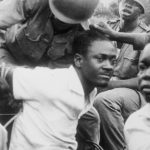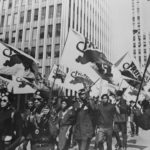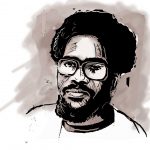Against commemoration: what happened after May 1968
In thinking about the practice of defence as more productive than that of resistance, Kristin Ross maps out France’s revolutionary moment from its ‘third-worldist’ roots.
Author:
1 February 2019

Question: In May ’68 and Its Afterlives (2002), you described France’s 1968 as a “union of intellectual contestation with workers struggles”. Left formations today struggle to create programmes of action that unite people of different sectors of society. What should the left know about the political struggles that unfolded in May 1968 in France? What thought and action enabled the coalescence of forces in 1968?
Kristin Ross: The practice of defence is something we can think about more closely, especially in its relation to the other political activity we are so frequently called upon to perform these days – namely resistance. Why is defending so much more generative of solidarity than resisting?
It is clear the contemporary movements I mentioned earlier have an enormous capacity to create solidarity across a wide range of different kinds of people, and a solidarity of a kind that is at least as interesting, and perhaps more interesting, to my mind, than anything that comes to mind when we talk about “the Global South”, for example.
Resisting implies the battle, if there ever was one, is over and done with, and we can only hopelessly try to ward off the overwhelming power we attribute to the other side. Defence, on the other hand, means there is something we have already that is ours, that we cherish, and that is worth defending.
And while what is being defended may start out as a piece of agricultural land, or an unpolluted environment, over time a whole host of other elements come to be included in what bears defending: the affective ties, sociabilities and new skills acquired in struggles of long duration. Japanese farmers outside of Tokyo who began by defending their way of life learned in the process the true violence of which the state was capable; they learned, too, a vital solidarity with urban students and workers, who for their part had never given the slightest thought until then as to where their food came from or how it was produced.
The zad at Notre-Dame-des-Landes is perhaps the most vivid example of a solidarity produced over years between very distinct components or groups involved in the struggle: old traditional farmers, young farmers, naturalists, petit-bourgeois shopkeepers, squatters, elected officials. The occupiers have a term for the way in which they have held such diverse elements together for so long – they call it “composition”.
Composition is essentially a working alliance between autonomous entities – a coming together and staying together that adds up to no final orthodoxy, just a continuing internal eclecticism. Composition is really nothing more than the fruits of an unexpected meeting between separate worlds, and the promise contained in the becoming-commune of that meeting. Holding such diverse elements together, according to the occupants, “is more a question of tact than tactics, passion than sad necessities, and opening up the field than carving up the terrain”.
The struggle for memory
Q: After 1994, South Africa entered a new, “democratic” political order. Much like France’s 1968, apartheid has not “suffered from too little attention”. Yet, the “management” of the national, mainstream memory of apartheid and it arising out of the colonial period of capitalism has been done in ways that often obscure the revolutionary histories and practices. The predominant authorship has fallen largely to the formerly radical, current ruling party, various previously militant figureheads and apolitical experts. What happened in the case of France? As you termed it in your book, what is at stake in the “management of memories” of revolt?
Ross: In France, it was the so-called left that “disappeared” 1968 – all the while they were making use of their participation in the movement to advance their careers and to justify their newfound reconciliation with the market. When they had succeeded in making sure that a structuring, anti-capitalist project no longer existed as the basis for defining the left, various turncoat ’68ers began to promote and repeatedly invoke new values like human rights.
As the 1970s drew to a close, we witnessed a full effacement of politics by ethics, history by sociology, and ideology by culture. The appeal to human rights became a kind of moral or spiritual supplement to the rearmament of capitalism that transpired in France, beginning in the late 1970s.
But your description of the “management” of the struggle against apartheid’s memory makes me think more generally about the way in which emancipatory struggles, almost by definition, draw on energies and imaginaries that largely exceed a category like “the nation.”
Like pan-Africanism, these liberating imaginaries are pre-national or extra-national in nature, often hearkening back to a pre-capitalist moment, and yet they invariably come to be corralled back later into the national fiction, whether by the ruling party or by opportunistic self-proclaimed “leaders” whose career ascendancy needs to get played out on a national stage.
“Neutral” or “objective” academic historians play a role in this reduction as well, at a later stage, in their chronic inability to think outside of the national narrative. When you begin a story with the state, you end with the state.
This is why unsavory characters like Richard Nixon or Nicolas Sarkozy, with their constant proclamations of the need to “obliterate” the 1960s, are so much more preferable than their liberal cousins.
A few months ago, I was summoned to the Élysées Palace to confer with a close aide to Emmanuel Macron about the young emperor’s desire to “celebrate” May 1968 this year. Not surprisingly, what he seemed to have in mind was a celebration of the usual neoliberal themes put in place 20 years ago: the modernisation of France, cultural transformation, the end of illusions, and so forth. When I told them (politely) that I couldn’t be bothered, all protocol was abandoned. They responded with a tirade of insults as though it were inconceivable that an invitation to the castle be turned down. A state that wants to bury the 1960s is much easier to deal with than one that wants to absorb and celebrate it.
What remains visible
Q: In the contemporary “leading” universities in South Africa, a colonial epistemology prevails. Theory is still taught as that which emanates from the North, while the South is but a case study and experience. The exportation of France’s 1968 often severs its relations with and position in the global politics of the time. The imperial and colonial conjunctures are rendered incidental.
In your book, you reconfigure this geography when you wrote that during the late 1960s: “theory itself was being generated not from Europe but from the third world. Not only was the figure of action, the militant peasant freedom fighter a third-world phenomenon – this, after all, was to be expected according to a standard international division of labour in which Europe and the West are the thinkers and the rest of the world the doers, the men of action. But ‘the wretched of the earth’ – Mao Zedong, Che Guevara, Frantz Fanon, Amílcar Cabral and others – had become, in this era of gauchiste reversal, the thinkers.”
How did French ’68ers position themselves in relation to global politics? What revolutionary theory and practice outside of France informed the production of dissent and revolutionary action locally?
Ross: It was the ongoing war in Vietnam that made possible the merging of the politics of anti-imperialism and anti-capitalism at the time in France. It created the sense that everyone – French workers and farmers, the North Vietnamese, and even French students were involved in the “même combat” against American imperialism. Class struggle, only intermittently perceptible in the West, was seen to be already operative at the international level in the relations between the imperial powers and the neocolonial countries.
In the late 1960s, it was relatively easy to make the connection between the Vietnamese struggle and the internal class struggles in the West. And the exemplarity of the Vietnamese in their struggle against American forces, with its David versus Goliath dimensions, lent a kind of triumphant or heroic aura to the figure of the third-world peasant that the Western factory worker did not always exhibit. As Sartre put it at the time: “The fundamental impact of the war on American and European militants was its extension of the field of the possible.”
Solutions to the problems of the third world could only be found in the replacement of the global capitalist system with a different economic order. “Colonial subject” and worker were fused into a single agent of class struggle, and all of the universalising power of the proletariat was projected onto the rebellion of the colonised.
This theoretical perspective did not, of course, appear on the curriculum in universities. Just as you describe the current situation in South Africa, the universities at the time were immune to such perspectives.
Related article:
The third-worldist perspective was disseminated in [more marginal] places in Paris like editor François Maspero’s bookstore, “the meeting place for all the contradictions of the left”, as Maspero himself called it, where the large presence of Africans, American blacks and Asians in Paris could be felt on a daily level, and where translations of Malcolm X and works by Fanon or Cabral rubbed shoulders with novels by Paul Nizan. I see Maspero’s politics of translation to be at the heart of what I called the “gauchiste reversal” – the fact that the third world came to be viewed in France and elsewhere as the place producing the thinkers and not merely the doers of world revolution.
None of this was surprising or new to those on the left growing up at the time in Paris, but what was striking to me when I began to think about my book was how much this internationalist dimension had come to be intentionally reduced, even “disappeared” by the late 1980s. Not one of the many television commemorations of 1968 on its 20th anniversary, for example, even mentioned the word “Vietnam” or made any reference to the anti-colonial context that had played such a large role in generating the political energies in France. It was that fundamental invisibility, along with the related invisibility of what was going on inside French factories in the 1960s, and not any kind of commemoration, that made me decide to write my book.
What interests me most of all in general has to do with when and in what way aspects of the past become visible (or invisible) to us today. When and in what ways do the struggles of 1968, for example, enter into the figurability of the present? Given the way in which the kind of anti-imperialist and anti-capitalist momentum we’ve been discussing had been eliminated from the picture in the late 1980s, in favour of a kind of narrative of modernisation and “lifestyle” liberalism, I knew I had to intervene quite squarely by making the international context highly visible from the outset.
Related article:
I decided to begin my history of 1968 and its afterlives not with the student uprisings in March 1968, as is usually the case, but with what was in fact the first demonstration of mass proportions in France in the 1960s: the protest of Algerian workers against a state curfew on 17 October 1961. This was a protest that ended with violent police retaliations leading to hundreds of Algerian deaths, deaths that were themselves actively “disappeared” from the official record. It was in fact demonstrations like these, linked to the end of the Algerian War at the beginning of the 1960s, that politicised some of the French students – a minority perhaps, but a significant one – who took to the streets a few years later.
Beginnings matter. Beginning someplace else allows us to see and say something new about the entire unfolding of an emancipatory movement; it “denaturalises” all of the myths of origin that have congealed around an event’s representation. By beginning here, with the Algerian march, a kind of continuity between student activists and the anti-colonial and national liberation efforts that had preceded them becomes visible in a way that could not be seen previously, due to the fog produced by clichés like, “France was bored.” Starting here, the frame then widens beyond the narrowly national story – something any consideration of a worldwide event like 1968 is obliged to do.
This is the last in a series of five articles that examine how protests and ideas generated in 1968 changed the political, social and educational contours of the world.
Part one:
Part two:
Part three:
Part four:
This is an edited excerpt of a longer interview first published by Thread.






